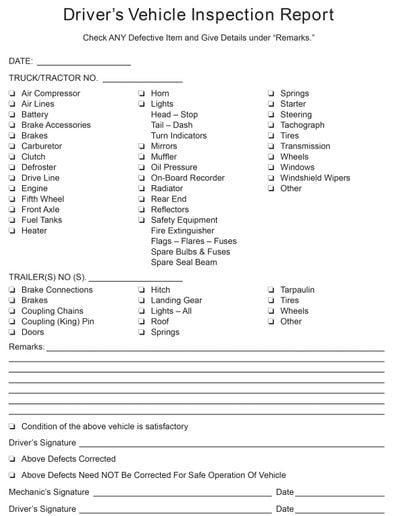Driver Vehicle Inspection Reports - What, When & How to Report
A common misconception about driver vehicle inspection reports for truckers and other commercial drivers is that one is required at every pre-trip inspection.
- How often must a walk-around pre-trip inspection be conducted? Before every trip.
- How often is a post-trip inspection required to be performed? After every trip.
When Does a Driver Have to Turn in a DVIR?
There’s seems to be a lot of confusion in the industry. The driver needs to do a pre-trip — they have to be satisfied the vehicles in good operating condition before they drive it. That’s the bottom line. There’s no report required.
If there's something wrong with the vehicle, the driver needs to get in touch with you and say, hey, this needs to be fixed before I can drive it.
If a driver discovers a safety-related defect during the pre-trip inspection, while there may not be a federal requirement to file a DVIR, you still need a process in place for how the driver reports it.
If he’s in the yard, does he head to the maintenance shop? If drivers are on the road when they find something, do they know who to call or message to work with to get that fixed?

Post-Trip Inspections and DVIRs
It’s at the end of the day, during the post-trip inspection, that finding a defect triggers the legal requirement from the Federal Motor Carrier Safety Administration to file a DVIR.
At the end of the day, the driver does a post-trip, which can be as simple as a quick walk around. But at that point, that's where the driver needs to submit a report to the company saying, ‘I have this defect on the vehicle.’ That's what's required in the regulations. If there's a defect on the vehicle, the company has to be notified, the driver has to complete a DVIR and submit it.
Some companies choose to have the driver submit a daily DVIR, defects or not, and that’s allowed in the regulations — it’s just not required by the FMCSA.
The Importance of the Post-Trip Inspection
Everybody talks about the pre-trip, but the post-trip inspection is actually more important.
If you do a post-trip inspection flawlessly, and catch everything, and have a maintenance shop or provider that now can have from 5:00 in the afternoon to 7:00 in the morning to repair it, the chances of you running a real tight ship is greater because now I've got extra time for the maintenance to get done.
You should shift the emphasis to the post-trip, because the pre-trip is then automatic. You've already done my post-trip, you’ve done all the repairs, your pre-trip is a whiz, you are just making sure that everything is signed off on.
If you put a tremendous amount of effort on the post-trip when it's back at the yard, when you have a technician that can take the next two hours fixing it, it changes the results tremendously.
So, everybody talks about the pre-trip. They know there's a post trip, but the emphasis really needs to be reversed. The post-trip needs to be the best.
DVIRs and Lighter-Duty Commercial Vehicles
Another point of confusion about driver vehicle inspections and DVIRs, is in lighter vehicles.
“The requirement applies to anything 10,001 pounds or more that you're using in interstate commerce. And there's a lot of people in that 10,001-to-26,000-pound category who don't think it applies to them, because their drivers don't have to have a CDL. So, they don't have to know how to do inspections, because they’re not taking a test on it.”
Content Disclaimer: Due to the constantly changing nature of government regulations, it is impossible to guarantee the total and absolute accuracy of the material contained herein or presented. NorthAmerican Transportation Association (NTA) cannot and does not assume any responsibility for omissions, errors, misprinting or ambiguity contained. NTA shall not be held liable in any degree for any loss, damage or injury caused by any such omission, error, misprinting or ambiguity present. It is made available with the understanding that NTA is not engaged in rendering legal, accounting or other professional service. If legal advice or other expert service is required, the services of such a professional should be sought.











